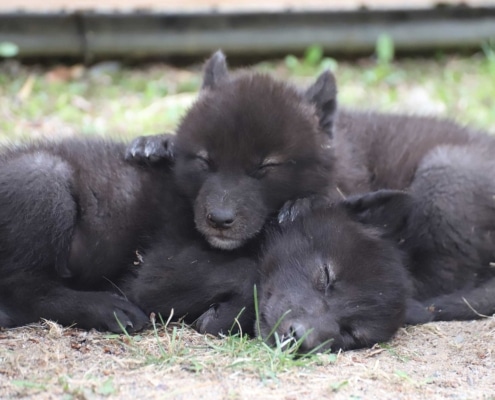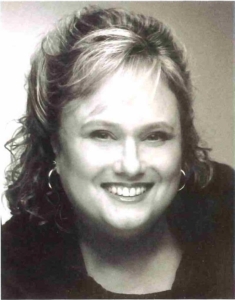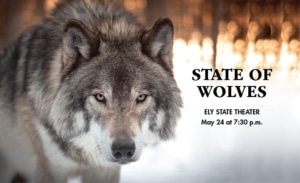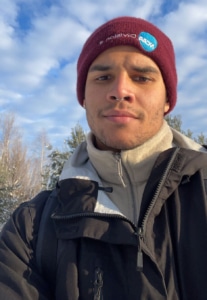Pups will be visible to the public on June 3, 2025
FOR IMMEDIATE RELEASE
 Contact: Krista Woerheide
Contact: Krista Woerheide
Email: krista@wolf.org
Phone: (218) 504-5173
Two male wolf pups, born April 22, have arrived at the International Wolf Center in Ely, Minnesota.
Ely, MN – May 27, 2025 – Visitors can see the pups during daily programming beginning June 3.
The International Wolf Center uses science-based education to teach and inspire the world about wolves, their ecology, and the wolf-human relationship. One method for accomplishing this is through the use of ambassador wolves. By watching the Exhibit Pack, visitors see a glimpse of their individual traits as well as the social nature of the species that makes them successful as a top-level predator.
People often portray wolves for their predatory behavior and don’t appreciate the intricate pack life and social organization that keeps them together as a social unit. We strive to maintain a socially cohesive unit of wolves that act as ambassadors of their species. The 2025 pup introduction is a significant investment in our pack’s future.
The International Wolf Center is a non-breeding exhibit, so when pups are added, we collaborate with a USDA-licensed professional animal organization. The source is dependent upon reproductive plans and availability within their facility, and the Center always adopts captive-born pups.
When will the pups join the rest of the pack?
Pups are typically ready to join the Exhibit Pack at around 3 months of age (when they are roughly 30+ pounds). This can also vary depending on the needs of the pups as well as the hormones and pack dynamics of the adults. We expect that pups will be introduced in the Exhibit by the first week of August, but this is always subject to change.
When and how can we see the pups?
The pups will be part of our daily programming after they have had time to grow and acclimate. We expect their first appearance to be on June 3. Each Pup Viewing Opportunity will be 15 minutes long and is included with the price of admission; these viewings will take place outdoors and are thus weather dependent. Viewings will be scheduled to occur nearly every hour (9:45 a.m., 10:45 a.m., 12:45 p.m., 1:45 p.m., 2:45 p.m. and 3:45 p.m.). Watch the website at wolf.org for a livestream of the pups during the day from 9:00 a.m. to 5:00 p.m. (CT) starting on June 3 as well. If you don’t see the pups right away, check back later; your patience will be rewarded!
What will their names be?
The International Wolf Center needs your help naming the pups. You can place your votes by visiting https://tinyurl.com/pupvotes. Voting closes on June 6 with names announced on June 9.
Advance tickets are available for purchase
To purchase admission tickets, click the Book Now button on the lower left-hand side of the page at wolf.org. International Wolf Center members receive free admission.
About the International Wolf Center: The International Wolf Center uses science-based education to teach and inspire the world about wolves, their ecology, and the wolf-human relationship. For more information about the International Wolf Center, visit wolf.org.
 In one of the largest donations made in support of wolves, Eileen Sutz, a native Chicagoan, has bequeathed her estate to three organizations dedicated to educating the public about wolves in North America. The recipients of her gift, Yellowstone Forever, the International Wolf Center, and Wolf Park will share in the funds equally. Each organization has plans to expand their wolf education programs and research with the support and vision of Ms.Sutz behind them.
In one of the largest donations made in support of wolves, Eileen Sutz, a native Chicagoan, has bequeathed her estate to three organizations dedicated to educating the public about wolves in North America. The recipients of her gift, Yellowstone Forever, the International Wolf Center, and Wolf Park will share in the funds equally. Each organization has plans to expand their wolf education programs and research with the support and vision of Ms.Sutz behind them.
Eileen Sutz, a lifelong wolf advocate, had strong feelings about protecting and supporting wolves. Believing they were misunderstood and unjustly maligned, she saw the importance of educating people about wolves and protecting the wolf population.
Ms. Sutz’s connection to wolves began in her youth. As a ballet dancer, model, and free spirit ahead of her time, she overcame many obstacles in pursuit of her dreams. She often experienced being misunderstood and constrained by the confines of conventional life, and found strength and resonance with wolves. She admired and found inspiration in their independence, loyalty, and resilience as well as their beauty and gracefulness.
Over the years, Ms. Sutz’s successful business career allowed her to pursue many of her passions including founding a theater company, supporting animal rescue organizations, and traveling the world to follow the Rolling Stones on tour for over 10 years, but her most enduring and passionate interest remained the welfare of wolves.
Physical ailments led to Ms. Sutz being homebound in her later years, and during that time she devoured news about wolves and began passionately defending them at any given opportunity. “It kept her fulfilled to keep working to support wolves,” says longtime friend Klaus Boettcher. “At the same time, it was devastating and depressing to see what was happening to them. She really wanted to support changing the narrative about wolves.”
Following Ms. Sutz’s unexpected passing from a stroke in February 2022, the search began to find organizations that fulfilled her vision, specifically those that supported wolf education and research and weren’t laden with bureaucracy. The three selected organizations have spent the past several months determining how they’ll expand their efforts thanks to the gift from Ms. Sutz. New studies about wolves are planned, new initiatives to train volunteers are in the works, and a new wolf education center is being considered, among other initiatives.
“Eileen would be so happy to know that she was able to make a difference in the lives of wolves, now and in the years to come,” Boettcher said. “Her legacy will live on.”
###
About the three recipients of the
Eileen Sutz Estate donation on behalf of wolves
Below are summaries of the three organizations that will share in the Eileen Sutz Estate, and their plans for the donations they will receive:
Yellowstone Forever
Yellowstone Forever is the official nonprofit partner of Yellowstone National Park. It helps fund priority projects in Yellowstone to protect, preserve, and enhance the park through education and philanthropy.
“A gift of this magnitude is truly transformational and will allow the Yellowstone Wolf Project to continue its over 25-year groundbreaking research to better understand and coexist with wolves,” said Lisa Diekmann, President and CEO of Yellowstone Forever.
Eileen Sutz’s estate gift will provide substantial support to Yellowstone’s Wolf Project team to continue its year-round monitoring and field research in which biologists gain data on the park’s wolf population dynamics, social behavior, ecosystem impacts, human-wolf relationships, and much more.
International Wolf Center
The International Wolf Center has sought to teach the world about wolves since it was founded in 1985 by Dr. L. David Mech. The Center welcomes 40,000 visitors a year to its interpretive center in Ely, Minnesota, and it informs the public through a busy website, quarterly magazine, virtual learning, and webinars.
The Center will use the Eileen Sutz estate funding to train new wolf educators across the world so they can spread the science about this misunderstood apex predator. “Thanks to these funds, our organization has a huge opportunity to leverage our community of followers around the world through the launching of a wolf educator training program,” Executive Director Grant Spickelmier said. “By training and equipping community wolf educators we can reach new audiences that might not otherwise hear from the International Wolf Center and simultaneously create a new set of engaged volunteers and champions for science-based wolf education. We like to think that Eileen herself would have been the first person to sign up.”
Wolf Park
Along with the celebration of their 50th anniversary in 2022, the staff, volunteers and board of Wolf Park in Battle Ground, Indiana, have reinvigorated their work to make their strategic visions a reality. Since 1972 Wolf Park’s team has worked steadfastly to provide naturalistic habitats for animals in their care, foster the creation of wildlife corridors and rewilded areas on its property to support our local ecosystems, and to offer spaces for the humans who work and learn at the facility to most effectively care for and learn from their wildlife ambassadors. Using Eileen Sutz’s gift, one of their many goals is improving buildings and exhibit areas to enhance the visitor experience and provide increased opportunities for educating about wolves and the value of their role in our environment.
Wolf Park is in the initial planning phases of a capital project that will include educational space named in honor of Sutz. “On behalf of future Wolf Park visitors of all ages, I wholeheartedly thank Eileen for thinking of the future of wild wolves and planning for how she can support their conservation for years to come,” Executive Director Karah Rawlings said. “Eileen’s legacy will have a permanent impact on the future of Wolf Park, and will allow us to continue to educate many generations about the importance of our vision to Save Wolves, Save Wilderness.”
Contacts:
Yellowstone Forever
Sam Barkley
Chief Development Officer
Phone: 406-848-2400
Email: sbarkley@yellowstone.org
Website: www.yellowstone.org
International Wolf Center
Grant Spickelmier
Executive Director
Phone: 763-233-7132
Email: grant@wolf.org
Website: www.wolf.org
Wolf Park
Karah Rawlings
Executive Director
Phone: 765-714-5291
Email: Karah@wolfpark.org
Website : www.wolfpark.org
###
FOR IMMEDIATE RELEASE
Contact: Krista Harrington
International Wolf Center
Address: 1396 Highway 169, Ely, MN 55731
Phone: 218-365-4695
Email: wolfcareauction@wolf.org
International Wolf Center has kicked off its 10th Annual Wolf Care Auction.
Ely, MN – The International Wolf Center is pleased to announce the opening of its 10th Annual Wolf Care Auction. The auction features a variety of artisan-made wolf-themed art, collectibles, photography, and the most sought-after items, knitted items containing wolf-shed fur from the Center’s ambassador wolves. The auction began on February 26 at 8 a.m. CDT and will end at noon CDT on Sunday, March 10, 2024.
The auction includes several items made by staff, such as Lino cut prints by Wolf Care Assistant Curator Abby Keller and hand-knit wrist warmers by Member Relations Manager Manisha Nordine.
“Our Wolf Care Auction provides a unique opportunity for individuals to support the Center’s mission to promote wolf education,” said Interpretive Center Director Krista Woerheidi. “All proceeds from the auction will support the exceptional care of the ambassador wolves provided daily by the wolf care staff.”
To place your bids, you will need to create an account first. A short video on how to use ClickBid is available on the International Wolf Center’s website. Please note that regulations covering wolf-shed items vary among states based on the protective status of wolves. State regulations prohibit the International Wolf Center from shipping these items to the following states: CA, CO, FL, IL, NE, NM, NY, VA, and WA. If you bid on an item containing wolf hair and reside in one of these states, your bid will be canceled.
The International Wolf Center is a 501(c)(3) organization whose mission is to advance the survival of wolf populations by teaching about wolves, their relationship to wildlands, and the human role in their future.
For more information, please contact the International Wolf Center at wolfcareauction@wolf.org.
###
For immediate release
Contact: Grant Spickelmier, executive director
Email: grant@wolf.org
Phone: 763-233-7132
 Special event on wolves is May 24 in Ely
Special event on wolves is May 24 in Ely
International Wolf Center plans unique presentation to commemorate its 30 years in Ely
A special event is planned in Ely to commemorate the 30th anniversary of the grand opening of the International Wolf Center. The event will be held at 7:30 p.m. on Wednesday, May 24, at the State Theater in Ely.
After an introduction by the Center’s Executive Director, Grant Spickelmier, a reporter and photographer from the Star Tribune will share findings and information from a key series they worked on together in 2022 called State of Wolves. The work by Greg Stanley and Anthony Souffle was published by the Star Tribune as a special section and shared information about the natural and cultural history of wolves in Minnesota. Following their presentation, they’ll be joined on stage by the Center’s founder, Dr. L. David Mech, who will discuss his research in northern Minnesota and how that work led to the creation of the International Wolf Center.
“We’re so excited to have this great program in Ely,” Spickelmier said. “I’ve seen the presentation from Anthony and Greg and it really highlights the special place that wolves occupy in Minnesota and Ely and the unique group of people that work with and study them. The story of how the International Wolf Center came to be, which Dave will talk about, is a fascinating one. Together, the two presentations will be both interesting and informative. We really hope we can fill the theater for this special event.”
The event is free, but pre-registration is required and seating is limited.
To register, visit bit.ly/stateofwolves.
The International Wolf Center was founded in 1985, and its interpretive center opened in Ely in 1993. Nearly 40,000 people per year visit the Center. In April 2017, the Center celebrated its one millionth visitor.
“During these 30 great years, we’ve welcomed people from all over the world into the Center,” said Interpretive Center Director Krista Woerheide. “We’re proud to be located in Ely and look forward to attracting even more visitors in the years to come.”
 For immediate release
For immediate release
Contact: Krista Woerheide
Email: krista@wolf.org
Phone: (218) 504-5173
Lucas Paschal will work with Voyageurs Wolf Project upon graduation from college
The winner of the 2023 Dr. L. David Mech Fellowship is Lucas Paschal, a student at Hamline University in St. Paul, Minnesota. The fellowship, awarded by the International Wolf Center, comes with up to $10,000 in funding to be used to further research about wolves.
Paschal will be partnering with the Voyageurs Wolf Project in northern Minnesota.
Dr. Mech founded the International Wolf Center in 1985 and is one of the world’s pre-eminent wildlife biologists. The fellowships are a way to honor Dr. Mech’s legacy and help the next generation of wildlife biologists get started in their careers.
Paschal learned he was the winner in late March during a phone call with Krista Woerheide, the Interpretive Center Director at the International Wolf Center.
“I was ecstatic to hear the news,” he said. “Thankfully I was with close friends at the time and was able to share my excitement with them.”
Woerheide said Paschal was chosen in part because of his clear passion for wildlife.
“Lucas really stood out in his application and letter of support because his passion for science and ecology was easy to see,” she said. “We can’t wait to see the results of his work with the Voyageurs Wolf Project, and we’re honored to play a part in getting his career started.”
Paschal said he has long had an interest in learning more about predators.
“This fellowship will help me reach my dream of studying large predators,” he said. “I think it’s hard to deny that large predators are very charismatic creatures, especially wolves. These animals demand a lot of attention from the public eye, and it seems like most of it is negative. I want to work with these animals to do as much as I can to protect them.
This is the second year that the fellowship has been awarded. Winners in 2022 were Lily Heinzel from Cornell College in Iowa and Cameron Ho from the University of Washington. The International Wolf Center offers the fellowship because it believes that continued investment in scientific discovery about wolves and other wildlife will lead to increased understanding of how to build a future where wolves and humans can coexist and thrive. The Center also understands that many barriers exist for students and early career researchers and hope these fellowships can be useful tools for opening up access to people pursuing a wildlife biology career.
“We’re really excited to see the partnership develop between Lucas and Voyageurs Wolf Project,” said the Center’s Executive Director, Grant Spickelmier. “It’s important to point out that these fellowships are funded by donations from our members, and we thank them for their financial support.”
Paschal is a senior at Hamline and will graduate this spring with three majors – Biology, Environmental Studies and History.
He will receive a $6,000 stipend and up to $4,000 in support for field research expenses.
His hometown is Macon, Georgia, and he’s a 2018 graduate of Veterans High School in Kathleen, Georgia. His parents are Roderick and Michele Paschal.
##
The International Wolf Center advances the survival of wolf populations by teaching about wolves, their relationship to wildlands and the human role in their future. For more information about the International Wolf Center, visit wolf.org.

The International Wolf Center uses science-based education to teach and inspire the world about wolves, their ecology, and the wolf-human relationship.
